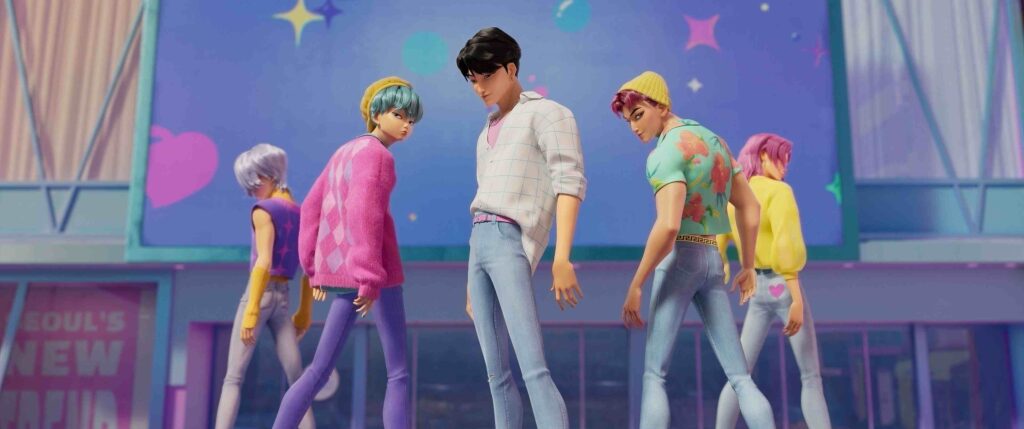Who gave K-pop idols; demon blades, glowing eyeliner, and a reason to wreck the underworld? Well, thank you Netflix, because this was chaotic in the best way possible.
Directed by Maggie Kang and Chris Appelhans, K-Pop Demon Hunters is an animated musical-fantasy-action film that follows Huntrix, a K-pop girl group who moonlight as demon slayers.
Their latest threat? A rival boy group called the Saja Boys, possessed by demonic forces and determined to destroy the mystical barrier protecting the world from chaos: the Honmoon. Premiere Date: June 20, 2025.
What Works Well?
Visuals and Animation:
The Visuals in the film are to die for, Valuated and kinetic, colorful without being garish. It borrows aesthetics from K-pop music video stylings, with hints of stop-motion fluidity.
Music:
With a soundtrack featuring TWICE’s “Takedown,” the music is a standout element. It’s high-energy and emotionally aligned with the plot, particularly in climactic battle sequences. Several songs are playlist-worthy, especially the group’s signature track “Golden.”
Plot Depth and Emotional Arc:
With a solid 4 out of 5 rating for plot, the story elevates its fantasy premise through strong emotional threads. Rumi’s identity struggle and Jinu’s tragic conflict are handled with surprising maturity and nuance for a musical-action film.
The Saja Boys:
The rivals-turned-antagonists are the sour pop in this otherwise sweet sonic journey. Their design, stage presence, and fight sequences are as polished as any real idol group.
Viewers were especially struck by Jinu, whose visuals and aura have drawn numerous comparisons to BTS’s Jungkook and frankly, no one’s complaining. The thirst was real, and so was the heartbreak.
What Falls Short?
Sound Mixing:
Some scenes suffer from poor dynamic balance; dialogue is occasionally too soft while musical numbers are overpoweringly loud.
Emotional Syncing:
A few sequences lack alignment between facial animation and vocal tone, especially during quieter, introspective moments.
Pacing for Non-Fans:
While the film draws good attention, it’s very likely that those who are not too familiar with K-pop or anime-style storytelling find the tone a little extreme or hyper-styled. Some humor and references may land unevenly across audiences.
Spoiler-Sensitive Plot Hints
Jinu’s Death:
In one of the film’s most poignant scenes, Jinu sacrifices himself to preserve the Honmoon barrier. His bond with Rumi, tinged with romantic undertones and a shared demonic lineage, gives his final moments surprising weight.
Rumi’s Backstory:
The lead idol, Rumi, hides her half-demon heritage. Her voice is faltering, a sign that her power and identity are linked. Her emotional arc is central to the story’s heart.
Jinu and Rumi Dynamic:
Jinu, the lead of the Saja Boys, shares a similar past. Their relationship begins in tension and slowly builds toward empathy; an enemies-to-allies arc that fans are already shipping.

Will There Be a Sequel and Could Jinu Return?
Fans are already flooding forums and social media with one collective cry: “Bring Jinu back.” And honestly? There’s room. K-Pop Demon Hunters ends on a cliffhanger, with unresolved family history, emotional tension, and an ominous future for the barrier. Fans have also started demanding a sequel exploring Rumi’s origins and her relationship with Jinu.
Even the final scene offers a symbolic ambiguity; Rumi hears a faint echo, a hum only she can feel. Sequel? Spiritual echo? Flashback redemption arc? There’s a high chance Netflix may listen to fan demand and find a way to bring Jinu back into the storyline, and the #Rujinu ship may sail.
Worth Watching?
Absolutely, with K-pop stan energy, Yes. K-Pop Demon Hunters vibrantly collects life around it, making rhythm and battle dance together surprisingly gracefully.
In terms of glaring faults, K-Pop Demon Hunters is sure to prove its mettle as an arresting, immersive musical and visual ride for K-pop and animation fans alike. “So, don’t waste any more time, or you’ll miss out on Jinu singing for you: My Little Soda-Pop.”
Rating: 8/10 ⭐
Written By MANSI SINGH
